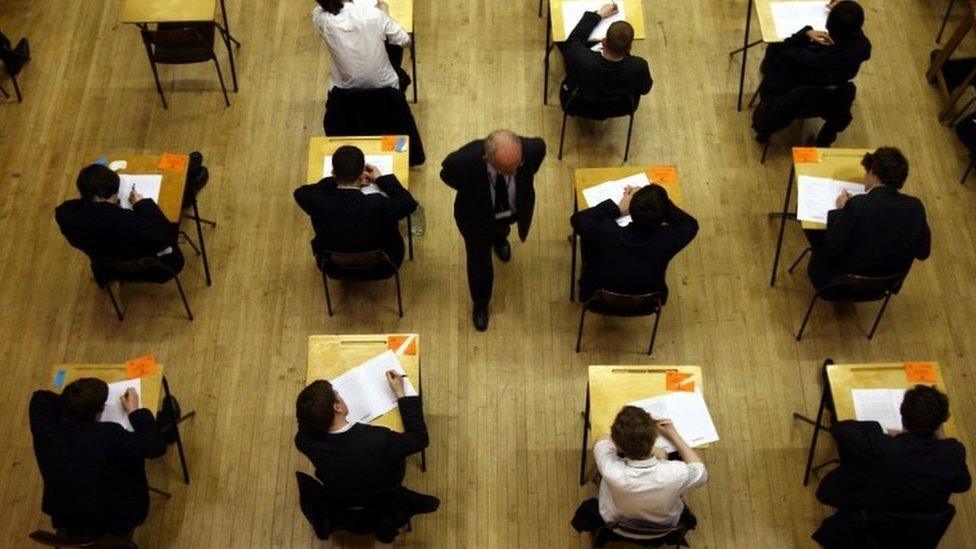A-levels: Pupils can appeal 'lower than predicted' results
- Published
Bradley Desmier was predicted a B, C and a merit but got a D, E and a pass
Pupils can appeal A-level grades if they are lower than what was predicted by teachers following an outcry over results.
Pupils had accused the Welsh Government of "abandoning them" after 42% of grades were lowered by the exams watchdog.
Education Minister Kirsty Williams has confirmed appeals will be allowed if "there is evidence" pupils should have received higher grades.
She said it gave "clarity" to students.
Ms Williams said the broadening of appeals by Qualifications Wales, meant students could now appeal if there was "evidence of internal assessments that has been judged by the school or college to be at a higher grade than the grade they have been awarded".

Students receiving results at Ysgol Glan Clwyd on Thursday
The Welsh Government had faced backlash from students, teachers, education bodies, and some of its own backbenchers, following the publication of A-level results on Thursday.
Due to the coronavirus pandemic, exams were cancelled this year, with students' final grades based on teachers' estimations.
But the exam watchdog, Qualifications Wales, lowered more than 40% of grades in a standardisation process after finding some teachers had been "too generous".
The detail of the results also showed more pupils on free school meals saw their A-levels downgraded - 48.1% - compared to 45.3% for pupils not eligible.

On Wednesday, hours before students found out their results, the education minister guaranteed that no-one would get a lower grade in their A-level than they achieved in their AS result.
Ms Williams had said she had to act to stop Welsh students being "disadvantaged" following changes to results in England, and Scotland.
But with the last-minute intervention coming after results had already been sent to schools and colleges, there are concerns that universities may judge applications on the grades already issued, before that revision takes effect.
Some students have spoken of getting results up to two grades lower than predicted, and being rejected by universities after not meeting required grades.
The latest guidance from Qualifications Wales now states:
An appeal can now be made on the grounds that there is evidence of internal assessment that has been judged by the school or college to be at a higher grade than the calculated grade awarded.
Internal assessment evidence will need to meet specific criteria "which is being finalised and will be published shortly".
If the appeal is successful, the learner's grade will be revised "to be the same as their internal assessment grade" but no higher than the centre assessment grade.
The watchdog said: "We have worked closely with WJEC [exam board] and considered the changes being introduced in England to find the best way forward for Welsh learners.
As a result, it said, it was extending the grounds for appeal for this summer's GCSE, AS and A levels, and the Welsh Bacc qualifications.

This does not go as far as saying pupils who are unhappy will get the grade estimated for them by teachers.
But it does allow appeals to be based on some of the evidence used by schools and colleges to decide those grades.
The big difference is that before this change, appeals could only be pursued on administrative grounds - for example, concerns that the exam board had used the wrong data.
There'll be more information in the next couple of days but there are some immediate questions about the practicalities of it all.
In view of the uproar since grades were published, it is inevitable there will be a huge number of appeals now the criteria has been opened up.
But how quickly can those be dealt with, when in many cases places at university depend on the result.
Some will still argue that it would be more straightforward and fairer to issue the original grades submitted by teachers, as happened in Scotland.
The Welsh Government's, WJEC and Qualifications Wales handling of the exam results process is set to be examined by a Senedd committee next week.
Plaid Cymru's leader Adam Price has urged the Welsh Government to ensure pupils in Wales are awarded lower grades received their predicted results instead.
"I would rather trust in teachers than an algorithm when it comes to a fair assessment of how a pupil would perform in an exam," he said.
Reacting to the development he tweeted: "Instead of adding yet more complexity and uncertainty, Welsh Govt should simply admit the failure and accept the teacher assessed grades."
Conservative MS Darren Millar earlier had called the situation "a mess" and urged a review.
"There have been A-grades downgraded to D's and B's to U's without any explanation or justification as to why these decisions have been made, and without regard to evidence provided by teachers on the progress of their students."
The Conservatives' education spokeswoman Suzy Davies said while she was pleased the Welsh Government had changed the appeals process, there needed to be guarantees the system would "not collapse under the demand".
"If that guarantee can't be given then today's announcement may still not allay concerns. I look forward to those guarantees being given swiftly and with confidence or this will not be going away," she said.
- Published13 August 2020

- Published14 August 2020
